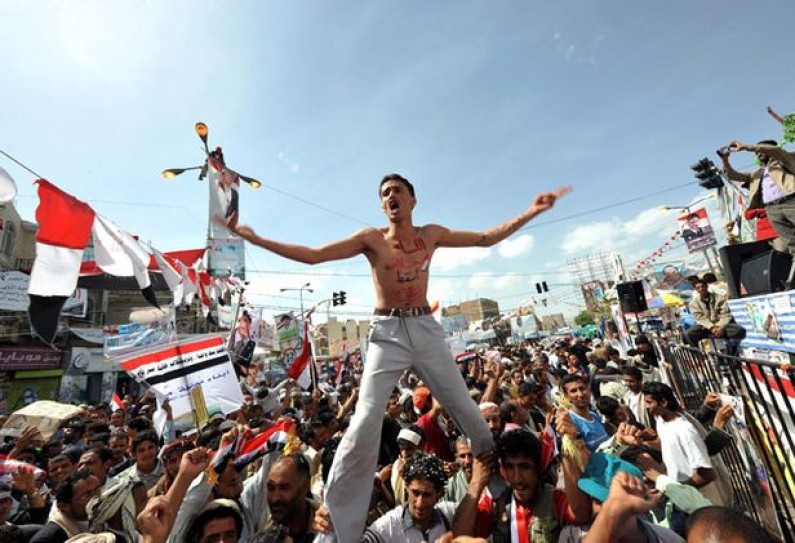
A general rule of thumb: You cannot make peace with liars. In the constant Arab and international tirades against “Israeli occupation,” consider the following scenario:
Violent settlers clash with the indigenous people. They take away their property and drive them off their land. Murders occur daily. There is no judicial recourse. The indigenous people are often relegated to the lower strata of society and the government makes sure they are kept there. This is a tragic state of affairs, when those people who lived peacefully in their country before the settlers came, are now being dispossessed of their land on the one hand, and being treated no better than slaves by these colonialist occupiers on the other.
Most people, especially if they work for the U.N. or for an assortment of other anti-Semitic organizations, would automatically assume that the above description is about Israel and the “occupied West Bank”. However, in point of fact, it is not about Israel. It has nothing to do with Israel. Rather, it is about Egypt and the Arab majority’s persecution of the indigenous non-Arab Coptic community, which are the descendants of the ancient Egyptians. The Copts’ land came under Arab occupation in the Seventh Century (along with most of the other lands in the Middle East) and they have endured bitter persecution ever since. Now, suppose the Copts had won back their homeland like the Jews in Israel, and they find they have an Arab population in their country with the same demographic balance as Israel’s, with the majority not having Egyptian citizenship. Would they be granted citizenship? If so, the Arab vote would conceivably outnumber the Coptic vote in a short time and vote Coptic Egypt out of existence. Then, what would happen? A possible answer could be found in events that occurred this year alone. In what would become known as the Nag Hammadi Massacre, in which a mob of Arabs descended on a group of indigenous Egyptians celebrating the Coptic Christmas and gunned down seven. Later in the year, another Arab mob instigated a riot in the town of Marsa Matruh and the local Copts were forced to barricade themselves in their local church for the duration of the violence. Considering this, would one think that in a Coptic Egypt, the question of partition would come up? Probably not. For one thing, mentally normal people don’t do that. A more likely scenario would be that only the peaceful Arabs would be given citizenship and the others would be encouraged to leave and go back to their Arabian homeland.
This Coptic-Arab experience could also have occurred to the other Arab-occupied people in any Arab-occupied country in the Arab-occupied Middle East. In Iraq for instance, since the start of the war, approximately 46 churches were bombed and thousands of Assyrian-Chaldeans were forced to flee their homes. According to the Assyrian International News Agency, eight Assyrians of Mosul were murdered in cold blood during February 2014 alone. In Lebanon during the 70’s, Arabs had massacred an estimated 100,000 Christian Maronites, which are the descendants of the ancient Phoenicians. Today, the Maronites suffer from violence from Arab supporters of Hizbullah causing its population to decrease dramatically. In Syria, the indigenous Aramean Syriacs suffer from imprisonment and torture.
The forced division of the Muslim Kurdish homeland, among Turkey, Syria, Iraq, and Iran has exacerbated their persecution, not only by the Turks, which is legendary, but also by the poor, victimized Arabs as well. Both Turkey and Syria refuse to recognize the Kurdish autonomous region in northern Iraq. Under Saddam’s regime, in Kirkuk, Arabs had attempted to drive the Kurds out. In Syria, Kurds have been arbitrarily arrested since May of 2014.
North Africa is another area where there is a wonderful democratic integration with the Arabs, who call this part of Africa the “Arab Maghreb,” which is a not too subtle racist dig against the indigenous Berbers, the Amazigh. In this “Arab Maghreb,” especially in Algeria, Morocco, Berbers are subject to identity persecution by their Arab overlords, who have sought to institute a strict policy of Arabization. South of this region is the Sahel, where, especially in Sudan, indigenous black African tribes have been enslaved by their Arab overlords. From time to time, expulsions from here occur such as what happened to the Nubians, the bulk of whom were forced to migrate to southern Egypt or Kenya where they live today. Additionally, the atrocities of Darfur and the South are also well-documented.
In Israel, the Jews are that country’s indigenous people, just as the Copts are native to Egypt. Of course, supporters of groups such as Peace Now, Gush Shalom, or Gush Emunim will probably laugh at that, but that’s because they are nothing but self-hating Jews who really have no business being in Israel in the first place. The truth is the truth and those sects considered dangerous “Palestinian” Arabs should be encouraged to leave and go back to their Arabian homeland while the peaceful “Palestinian” Arabs should be granted citizenship. (Of course, after what happened to Gush Katif and the northern Shomron, why would any Arab (or Diaspora Jew for that matter) be stupid enough to want Israeli citizenship?) Still, when considering the Middle East and especially the rise of Jew-hatred internationally, it is important to remember who the occupier and the occupied really are and that democracy is a dream within reach.
Blog by David Silon


